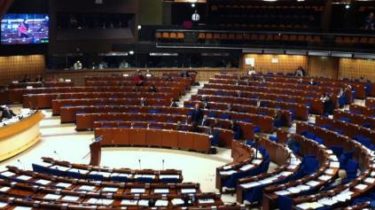“Not a tragedy”. The Ukrainian delegate said the adoption of the PACE resolution on educational law

The resolution, which took PACE regarding the Ukrainian law on education, is not a tragedy for Ukraine.
This was stated by the Chairman of the Ukrainian delegation to the parliamentary Assembly of the Council of Europe Volodymyr Ariev, writes “Interfax-Ukraine”.
See also:
PACE Rapporteur on Ukraine resigned
“I think the tragedy of this report do not exactly need. Resolution is a purely political point. It does not require Ukraine to make some concrete steps. The only thing that there is a recommendation to Ukraine to implement the results of the examination of the Venice Commission… From a legal point of view for Ukraine after the report, nothing has changed. Waiting for the conclusions of the Venice Commission”, – he stressed, noting that Ukraine was ready for such a recommendation and not against to amend the law on the basis of the conclusions of the Venice Commission.
According to the Aryans, and in the resolution and during the performance, members of the Assembly welcome the fact that the Ukrainian side voluntarily sent the text of the law on the analysis to the Venice Commission.
“I believe that the attempt of this report was political,” – said the head of the Ukrainian delegation.
Recall, September 5 during a meeting of the Rada adopted the law of Ukraine “On education”, which introduced the 12-year secondary education. The language of instruction in educational institutions determined by the state. The document envisages that the institutions can be taught one or more courses in two or more languages – Kazakh, English and other official languages of the European Union. Persons who belong to indigenous peoples and national minorities of Ukraine is guaranteed the right to education in their native language along with the Ukrainian language in public institutions of preschool and General secondary education.
Romania and Hungary, criticized the adopted law on education, believing that it violates the rights of national minorities in Ukraine. Statements with respect to Ukrainian law by the Ministry of foreign Affairs of the two countries. The President of Moldova Igor Dodon hopes that Ukraine will reject the new education act because of the violation of the rights of national minorities. According to him, the new education Act will lead to the abolition of the system of education in the native language of the ethno-cultural minorities in Ukraine. Subsequently, in Russia, this law called “an act of forced Ukrainianization, which constituted a flagrant violation of Ukraine ratified the European Charter for regional or minority languages”. “The state Duma has prepared a statement regarding the Ukrainian law on education, in which he condemned adoption by the Verkhovna Rada of the document. The Russian foreign Ministry stressed that the document infringes on the interests of millions of Russian-speaking residents of Ukraine.
But the Council of Europe experts welcomed the law on education in Ukraine. On 28 September the Minister of foreign Affairs of Ukraine Pavlo Klimkin sent the education act for consideration of the Venice Commission.
12 October PACE held an emergency debate about the law and the results of the adopted resolution with recommendations for Ukraine. In particular, according to delegates, the law does not provide for the right of national minorities to study in their native language and significantly reduces their rights as concerned members of the Assembly. Moreover, it is noted that to obtain the conclusions of the Venice Commission “the Assembly considers it premature to take a position in relation to any legal issues.
“The Assembly recommends to the Ukrainian authorities to reconsider the question of minority languages in education, taking as a basis a flexible model of bilingual education for all persons belonging to “indigenous peoples” and “national minorities” that was not discrimination. In practice, the possible benchmark may be at least 60% of the curricula in the Ukrainian language and 40% – in the languages of national minorities”, – consider in the PACE.